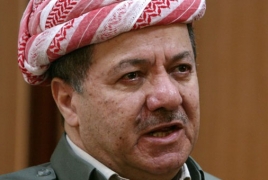Barzani calls for new deal paving way for Kurdish state January 22, 2016 - 12:54 AMT PanARMENIAN.Net - The president of Iraq’s autonomous Kurdish north has called on global leaders to acknowledge that the Sykes-Picot pact that led to the boundaries of the modern Middle East has failed, and urged them to broker a new deal paving the way for a Kurdish state, the Guardian reports. Massoud Barzani, who has led the troubled country’s Kurds for the past decade, said the international community had started to accept that Iraq and Syria in particular would never again be unified and that “compulsory co-existence” in the region had been proven wrong. “I think that within themselves, [world leaders] have come to this conclusion that the era of Sykes-Picot is over,” Barzani told the Guardian. “Whether they say it or not, accept it or not, the reality on the ground is that. But as you know, diplomats are conservatives and they give their assessment in the late stages of things. And sometimes they can’t even keep up with developments.” The political map of northern Iraq has changed drastically in the 18 months since Islamic State overran Iraq’s second city, Mosul. Kurdish forces are now in full control of Kirkuk and Sinjar and have claimed control of thousands more miles of land that had been under control of Iraq’s central government. Four months before the centennial of the Sykes-Picot agreement under which Britain and France carved spheres of influence from the ruins of the Ottoman Empire, Barzani said maintaining the status quo would ensure further regional disintegration and destruction. He said independence, which has been the centerpiece of Kurdish ambitions for decades but has been fiercely opposed by suspicious regional neighbors, was “now closer than at any other time”. Countries that had long been against the move were being swayed by the claim that sovereignty within the current borders of the Kurdish regional government could instead bring clarity, he said. Barzani said regional and global powers now needed to enshrine a new pact that would protect communities in Iraq and Syria, where divisions have become entrenched on socio-religious and sectarian lines. “There must be a [new] agreement, it is important to see what type of agreement it is, what mechanism it can bring and rely on to formalize things, and what will be its status. When the formalization of that agreement will be is not known yet. It’s illogical to continue or insist on repeating a wrong experiment that was repeated for 100 years and is leading nowhere.” Barzani announced he would push for independence on 1 July 2014, the first time a Kurdish leader had pledged to do so after decades of armed struggle, civil war and displacement. The announcement was meant to lead to a referendum, but it failed to generate momentum and was soon subsumed by the Isis advance on Erbil, and the worsening crisis in Iraq and Syria. He told the Guardian that some neighbors had come to see the Kurdistan region as a source of stability in a region otherwise dominated by geopolitical chaos. “All of the opposition to us has been based on some wrong perceptions. The Kurdistan region is not a source of threat for any of the neighbors. Our experience throughout the last 15 years proves that we are the element of stability.” Barzani also said regional attitudes had shifted markedly. “It has been a dramatic change,” he said. “To give you one example. Using Kurdistan and Kurds was forbidden in Turkey, but a month ago when I went to Turkey, the Kurdistan flag flew in the presidential palace. “If you compare it to the time I have lived with, throughout all our experiences, I think it is now much closer than at any other time. I know that it’s a heavy weight, but it’s a sacred responsibility.” Photo: AFP/Getty Images Authorities said a total of 192 Azerbaijani troops were killed and 511 were wounded during Azerbaijan’s offensive. In 2023, the Azerbaijani government will increase the country’s defense budget by more than 1.1 billion manats ($650 million). The bill, published on Monday, is designed to "eliminate the shortcomings of an unreasonably broad interpretation of the key concept of "compatriot". The earthquake caused a temporary blackout, damaged many buildings and closed a number of rural roads. Partner news |